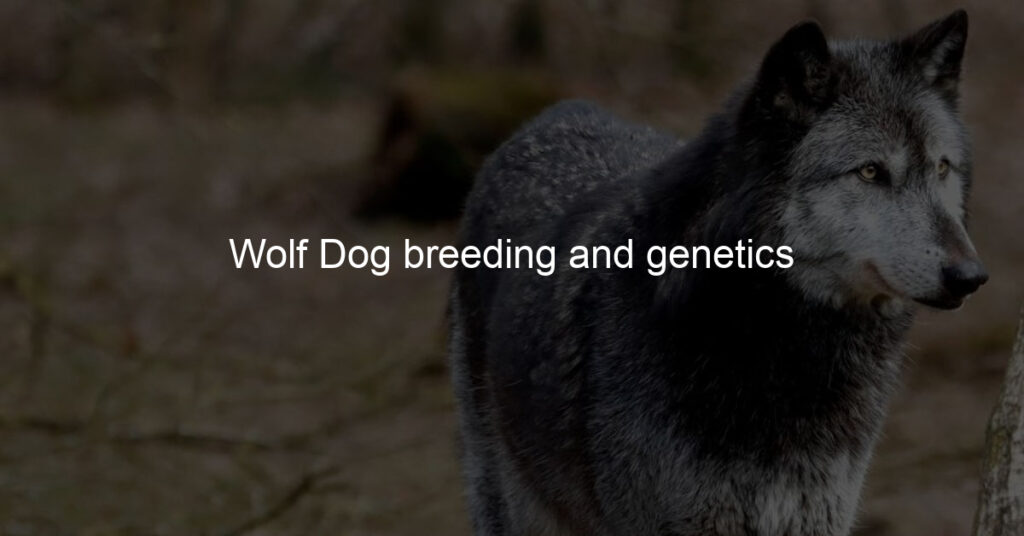If you’re a wolf-dog lover who has ever wanted to learn more about the history and genetics behind this hybrid’s unique characteristics, then you’ve come to the right place! Wolf dogs are incredible animals, but they can also be quite tricky when it comes to their breeding and genetics.
What dog breed is genetically closest to a Wolf Dog?
If you’re looking for a doggy companion that looks like a wolf, then the Alaskan Malamute might be the perfect pup for you! While no dog is exactly genetically similar to a Wolf Dog, the Alaskan Malamute is closest in terms of genetics – it’s even one of the oldest dog breeds out there.
The origins of these dogs trace back to around 4000 BC in what was known as Siberia. And despite being genetically closer to wolves than almost any other breed, these furry friends are known for being quite friendly and also make amazing family pets. So if you’re looking to add an extra bit of wildness to your home, why not give an Alaskan Malamute a go?
How much DNA does a dog share with a Wolf Dog?
It is well known that dogs have a strong connection to wolves, which is why it’s intriguing to look into exactly how much DNA the two share. Well, as it turns out, studies have shown that dogs share up to 98.7% of their DNA with grey wolves!
In other words, almost every gene present in a dog can also be found in a wolf dog – it comes as no surprise that these two species are so closely related from a genetic point of view. Interestingly enough, some research has even suggested that wolf dogs may be more adept at certain physical and mental tasks than domestic dogs due to the advantages genetics inherited from their wild ancestors provide them with.
Is it possible to breed a wolf and a dog?
It is possible to breed wolves and dogs, although the resulting hybrid would be more commonly known as a wolf-dog. The scientific name for this type of hybrid is Canis lupus familiaris and it can occur naturally in the wild when a wild wolf and domestic dog meet.
Certain breeds such as huskies, malamutes, and German Shepherds tend to be genetically closer to their wild wolf cousins due to selective breeding over many generations and can therefore result in successful breeding with wild wolves. However, it should be noted that hybrids may have unpredictable behavior, so those considering getting one must understand the risks of doing so.
What makes a dog a wolf hybrid?
Wolf hybrids are an interesting breed of dog that has recently become more popular as domesticated animals. The hybrid consists of a purebred wolf and purebred dogs, usually a shepherd, husky, or malamute.
Though they may look like normal dogs in many ways, the difference is found in their genotype and phenotype. A wolf hybrid will typically be larger than a regular domestic dog and can weigh anywhere from 50-70lbs.
These animals have strong prey drives and can have temperament swings not often seen in traditional breeds. Therefore, it’s important to understand both the unique joys and dangers that come with owning this type of animal before you commit to adopting one!
What two breeds make a wolf dog?
Wolf dogs are an exotic breed made from the combination of two popular breeds: the Wolf and the Dog. The Wolf Dog is a hybrid created when either a wild wolf or wild dog is crossed with a domestic dog, such as an Alaska Malamute, an Alaskan Husky, a German Shepherd, or a Czech Shepard.
These strong animals have qualities of both predators and their domesticated counterparts- they are smart with loyal dispositions to humans. Since they are part wolves, these fantastic animals require extra care and patience to create true companionship with their owners!
Why can’t Wolf Dogs be domesticated?
Despite its name, the Wolf Dog is more closely related to wolves than dogs. The hybrid breed has been popular in recent years but attempts to domesticate them have sadly not been successful. This is because their feral nature and instinctive behaviors are just too ingrained; oftentimes, a Wolf Dog cannot be tamed no matter how much training they receive or how early they’re socialized.
This also means that it’s usually best for them to remain in the wild, where they can live out their lives naturally and peacefully. With that being said, it’s ultimately up to responsible owners whether or not to adopt a Wolf Dog – just make sure you’re prepared for the commitment that comes with these magnificent animals!
Conclusion
After exploring the genetics behind wolf-dog breeding, it’s clear that responsible wolf-dog owners should do extensive research and proper due diligence to understand the complexity of the breed. Wolf dogs can be a wonderful addition to someone’s family, as they are usually gentle and playful. It’s important to note however that their behavior may not always be predictable, so patience and consistency with training are essential. Furthermore, any potential owner should consider the amount of space needed for a wolf dog as well as the financial considerations needed for veterinary care, etc. All in all, responsible ownership of wolf dogs requires time and dedication but the rewards can be substantial if done correctly. One must remember that wolves require special attention when relating to other animals or people and will never be completely domesticated, so any potential owner should seek expert advice before choosing a wolf-dog hybrid for their family.








